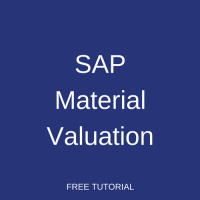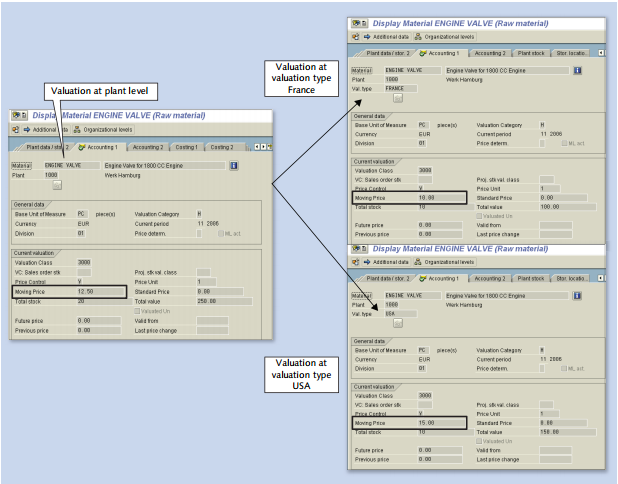 This tutorial which is part of our SAP MM course talks about SAP Material Valuation. You will learn about the concept of material valuation in SAP MM. We will talk about valuation levels and valuation methods. Explain the difference between standard and moving average prices as well as introduce the functionality of split valuation. We will provide step-by-step explanation and screenshots illustrating these processes.
This tutorial which is part of our SAP MM course talks about SAP Material Valuation. You will learn about the concept of material valuation in SAP MM. We will talk about valuation levels and valuation methods. Explain the difference between standard and moving average prices as well as introduce the functionality of split valuation. We will provide step-by-step explanation and screenshots illustrating these processes.
SAP valuation area is the organizational level at which materials are valuated such as at the plant or company code level. When the valuation area is at the plant level, you can valuate a material in different plants at different prices. When the valuation is at the company code level, the valuation price of a material is the same in all of the plants of the company code.
Material valuation at the plant level is mandatory if your system is a retail system, or if you want to use either the Production Planning or Product Cost Accounting components.

To define the valuation area at the company code or plant level you should access the path below in SPRO transaction:
Enterprise Structure -> Definition -> Logistic General -> Define Valuation Level
Depending on your requirements, set the valuation level at a company code or at a plant.

Once you’ve defined the valuation area, it is very difficult to change it afterwards because this is the fundamental setting.
SAP Valuation Methods
Material valuation is carried out according to the price controls set in the SAP system. Based on the business scenarios, we can set the valuation method as moving average price (price control V) or standard price (price control S).
The valuation method is defined in the Accounting 1 view screen of the material master. You can check in this view the total stock quantity and total value of a material.

A standard price is a fixed price defined in the material master record. In general, this method is used for finished goods. In the standard price procedure, the valuation price is defined and fixed in the material master record. If price in a purchase order (PO) is different (either more or less) from the standard price, the difference amounts are posted to a price difference account.
On the other hand, moving average price is a weighted average price. The movements of materials such as goods issue or goods receipts may impact moving average prices. The moving average price will change if purchasing prices of a material are changed. This price is calculated as shown below:
Moving average price = Total stock value / Total stock quantity
The material master record will always be updated with the current moving average price.
Configuration
You must assign the valuation method in the Accounting 1 view while creating material master records. But to reduce the time, you can assign the price control to the material types, so that the price control will be set automatically by the system later on for new materials. To do that, access the path below in SPRO transaction:
Logistic General -> Material Master -> Basic Settings -> Material Types -> Define attributes of material types

Material Price Changes
Material prices can be changed over a period of time due to changes in the market price. The SAP system includes functionality to accommodate these changes, and the stock valuation is revaluated as per the current market price.
Valuation prices can be changed based on business requirement for three scenarios:
- A price change during the current posting period
- A price change during the previous posting period and changes are not carried over to the current period
- A price change during the previous posting period or year and changes are carried over to the current period
Note that changing the material price doesn’t involve changing the material master record. It is an accounting transaction in which the total stock for a valuation area is revaluated. The transaction code MR21 is used to change prices. After the prices are changed, accounting documents are generated and the stock account, expense/revenue accounts will be involved.
SAP Split Valuation
Split valuation helps you to valuate sub-stocks (part of the total stock) of a material in different ways. There are a number of reason you might want to valuate sub-stocks separately, such as:
- The material has different origins (e.g., materials have different country of origin)
- The material is acquired via different types of procurement (e.g., external procurement or internal procurement)
- The material has different categories of quality (e.g., damaged, poor quality or good quality)

Note that split valuation in SAP is used only with the moving average price control, and materials that are subject to split valuation can be valuated only via moving average price method.

To activate the split valuation in the system, you must follow this path in SPRO transaction:
Material Management -> Valuation and Account Assignment -> Split Valuation -> Activate Split Valuation

To configure the split valuation in the SAP system, you must follow this path in SPRO transaction:
Material Management -> Valuation and Account Assignment -> Split Valuation -> Configure Split Valuation
Choose Global Types button to create new valuation types and define their attributes.

- Ext. POs: This field indicates whether external POs are allowed or not.
- Int. POs: This field indicated whether internal POs are allowed or not.
- ARef (Account Category Reference): This field is used to group valuation classes. Specify for which account category reference this valuation type is allowed.
Choose Global Category button to create new valuation categories and define their attributes.

- Default Valuation Type External Procure: The valuation type selected in this field is proposed at the time of PO creation.
- Default Valuation Type External Procure Mandatory: The default valuation type is mandatory and can’t be changed in the PO.
- Default Valuation Type In-House Production: The valuation type is proposed at the time of production order creation.
- Default Valuation Type In-House Mandatory: The default valuation type is mandatory and can’t be changed in the Production Order.
- Determine Valuation Type Automat: The system will automatically determine the valuation type at the time of goods receipt. This indicator is only useful for materials that are managed in batches. A valuation record is automatically created for each batch.
Click on ![]() button to activate valuation types for the valuation category.
button to activate valuation types for the valuation category.

You can check the valuation type and valuation price in the Accounting 1 view of the material master by using the transaction MM03. If you select a valuation type at the organizational level, the system will display the stock valuation for the selected valuation type.

—
Did you like this SAP MM tutorial? Have any questions or comments? We would love to hear your feedback in the comments section below. It’d be a big help for us, and hopefully it’s something we can address for you in improvement of our free SAP MM tutorials.
Navigation Links
Go to next lesson: SAP Inventory Valuation
Go to previous lesson: SAP Purchase Order Acknowledgement
Go to overview of the course: SAP MM Training

hi,
could be used batch management & split valuation type same time for same material type?
regards.
Yes, it is possible to use batch management and split valuation for the same material at the same time. If a material is both split valuated and batch managed, then its valuation type is saved in the batch master record.
the consultant tried to apply it. When he go to make sales order the system gives in availability check column all qty available of two valuation type.
How could make availability check qty give qty belong the only one valuation type i selected.
Thank you
I think that you might need to use a user exit for this purpose. Another option will be to specify a batch in a sales order, and then ATP check can be performed at the batch level (each batch belongs to a particular valuation type).
No other way? Because I want warehouse to specify the batch.
Regards.
Can you please explain how do you want see the whole business process? Do you want sales people to enter material valuation type in sales orders?
Thanks for your concern. The business process Should be as below:
1- Make purchase order or contract of material without specify valuation type and batch.
2- In warehouse Goods receipt will enter qty with valuation type and batch (should deducted from po qty of the material)
3- Sales people should enter the material and valuation type only because each valuation has its own price.
4- Warehouse will specify the batch in outbound.
Hope you help me to apply this business process.
Regards.
Unfortunately, it is not possible to perform ATP check in a sales order based on valuation type. The standard levels for ATP check are: 1) plant, 2) storage location, 3) batch. If you want to perform ATP based on valuation type, you will need to use a user exit. Please check SAP note 2194342 (https://launchpad.support.sap.com/#/notes/2194342) for further information about user exits that SAP recommends for this purpose. I hope it helps!
Ok. Thanks for your concern.
Best regards
Dear Expert,
Good day.
May I know how was the valuation type is automatically determined in the sales order?
In the material master record in the Accounting tab, the valuation category is set to Q.
In OMWC, the valuation cat Q (Quality) the automatic local valuation categories for plant P500 is not tick.
I have 4 different material in one sales order, the valuation type was automatically determine for the first three item but not for the last item. Although when I check the set up in material master record it has the same info and all was maintained with valuation type as per checking in table MBEW. Looking forward for your inputs on this.
Thank you so much,
Arlene Siozon
Are these materials managed in batches?
Can we get automatic material price in PO by Valuation Type ?
(Without creating inforecord for the material)
dear expert. in my company want to implement valuation type in batch management. which bath have characteristic (Classif class type 023 and 300), how to configuure this? becouse when i trying to set cost estimate. that material can not be set.
Thankyou